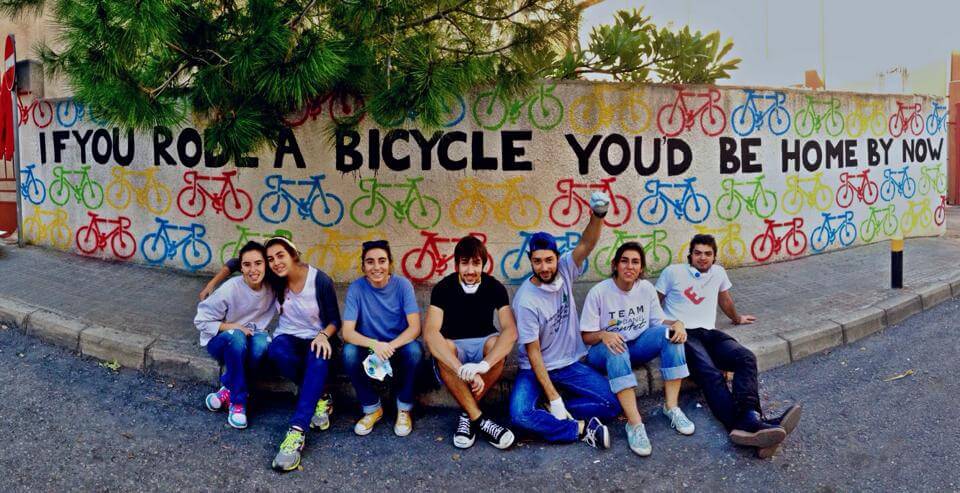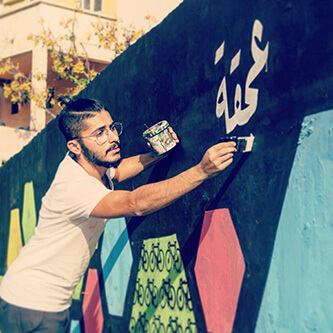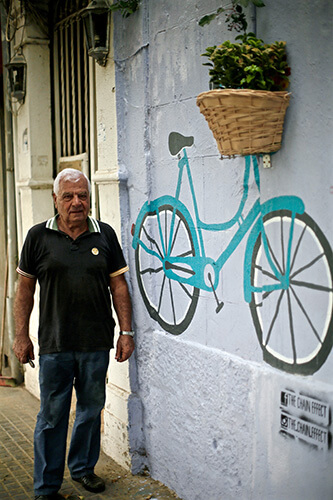Autumn Gear Guide
Find inspiration in our Gear Guide that will keep you out on your bike through wind or rain.
Download NowThe Chain Effect collective hopes to stir up conversation around bicycling in the auto-centric city.

The Chain Effect collective and friends pose in front of one of their murals. Photo courtesy of Zeina Hawa.
“A bicycle is revolutionary – it has the power to transform urban landscapes and social frameworks when introduced into daily lives and travel patterns. It is the ultimate symbol of freedom, equality and sustainability in a society.”
This is from the Facebook description for The Chain Effect, a collective of street artists in Beirut, Lebanon who aim to bring utility cycling to the masses in the Middle Eastern city. Started by three friends in 2014, The Chain Effect paints colorful murals onto the walls and buildings all around the city, gently encouraging others to give biking a try. A wall in a particularly congested part of the city is covered in stencilled images of bicycles, with large block letters reading “If you rode a bicycle, you’d be there by now.” Others simply feature large images of bikes so passing residents can’t help but have them on their minds.
“Despite the activity’s recent growth, there is no real bicycle culture in Beirut,” explained Zeina Hawa, one of the founding members of the collective. “It isn’t widely recognized as a form of transport yet, not for the public and not within the government.” While people cycle for recreation and fitness, those who bike for transportation are few and far between. Hawa blames a general misconception about the safety of cycling as one of the principal barriers to developing a stronger bike culture. Those who ride in the streets are perceived as brave and daring, when in reality, she says, it’s actually quite pleasant and safe. Generally narrow streets and low traffic speeds mean cars don’t pose as large a threat to people on bikes as they do in other places, and she believes Beirut has enormous potential to be a great cycling city if more people took it seriously.

One of the collective members works on a mural. Photo courtesy of Zeina Hawa.
In 2013, the first bicycle delivery service in the Middle East launched in Beirut and its suburbs. Cycling for leisure, sport, and touring has been steadily gaining in popularity – especially for weekend excursions to the coast and to the mountains – and a few groups organize regular rides in and around the city. Yet despite these advancements, the perception of cycling as niche market and dangerous persists. So together with her friends and fellow artists, Hawa aims to bring the benefits of biking to the masses.
“Public art in itself is already such a powerful way to reach people because it is highly visible, very interactive and targets everyone, regardless of economic class, education levels or accessibility,” she said. “It made so much sense to use public art to create a stir about bicycling and sustainable mobility because it is highly situational – the activity of getting from place to place happens in a city’s streets – and it really pushes people to think about their transport patterns and habits while they are in the process of moving around.”
Since they started in 2014, the reaction from the public has been overwhelmingly positive. Hawa admits the group never set out to create The Chain Effect. They started out with a single, large project that was intended to be a one-off thing, but the response they received was so enthusiastic they decided to keep going. “Today, hardly anyone we talk to has not seen or heard of ‘the bicycle walls’, and since we started painting we’ve seen so many photos of our walls posted on social media, a lot of which are taken by people who were stuck in traffic and noticed the painting,” she said. The three of them are involved in each of the paintings, and they are often joined by volunteers – some of whom get up at 6 am to help them paint before work – who appreciate what they’re doing and want to help out. They did a large-scale project over the course of a few weekends where they were joined by 45 schoolchildren and scouts, and they have plans to organize a few other similar community-based projects this summer.

A shop owner stands behind the new painting on his wall. Photo courtesy of Zeina Hawa.
Most of the walls they use are privately owned. The collective approaches the owners ahead of time to get permission, and so far hasn’t had anyone turn them down. “On several occasions we’ve had some of the owners of the walls actually help us out, hang around or take pictures with us,” said Hawa. In the short term, they’re planning more paintings with varied messages and designs to create an expanded network of bike-based art around the city. Eventually, they’d like to move on to large-scale paintings, such a large building facade, in order to really drive their message. “We want to generate a louder conversation amongst the public, and eventually move into initiating a conversation on mobility and urban cycling with Beirut’s municipality alongside other organizations,” she said.
They’ve also discussed expanding their activity to Tripoli, the second largest city in Lebanon, as well as initiating a public exhibition showcasing portraits and stories of everyday cyclists in hopes of normalizing the activity.
“In Beirut, we hope to see a shift away from car-centered planning and development,” Hawa explained. “We’d like to see greater awareness among local authorities that building more roads for cars is outdated and a dead end, that we need to think about streets for everyone, all different types of users, and streets that invite people to enjoy their city.”
To learn more, visit The Chain Effect Facebook page.
Find inspiration in our Gear Guide that will keep you out on your bike through wind or rain.
Download Now
Leave a comment